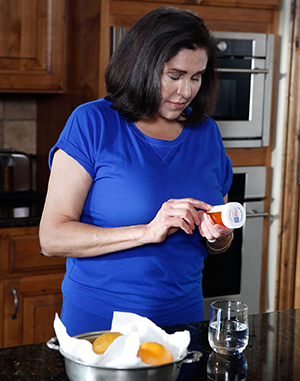A
B
C
D
E
F
G
H
I
J
K
L
M
N
O
P
Q
R
S
T
U
V
W
X
Y
Z
Click a letter to see a list of conditions beginning with that letter.
Click 'Topic Index' to return to the index for the current topic.
Click 'Library Index' to return to the listing of all topics.
Managing Post-Op Pain at Home: Medicines
Pain after an operation (post-op pain) is common and expected. These guidelines can help you stay as comfortable as possible.

Taking pain medicines
-
Take only the medicines that your health care provider tells you to take.
-
Don't take more than prescribed. Don't take your next dose sooner than prescribed.
-
Take pain medicines with some food to prevent an upset stomach.
-
Don’t drink alcohol while using pain medicines.
-
Don't drive while taking opioid pain medicines.
Types of pain medicines
Non-opioid
-
Check with your health care provider before you take any over-the-counter (OTC) pain reliever in addition to or instead of your prescribed pain medicine.
-
Non-opioids include OTC acetaminophen and ibuprofen and some prescription pain relievers.
-
All relieve mild to moderate pain. Some reduce swelling.
-
Possible side effects include stomach upset and bleeding. High doses may cause kidney or liver problems.
Opioid
-
Opioids are available only by prescription.
-
Opioids ease moderate to severe pain.
-
Possible side effects include stomach upset, nausea, drowsiness, rash, and itching.
-
Opioids may cause constipation. To help prevent this, eat high-fiber foods and drink plenty of water.
-
Your health care provider may recommend a stool softener.
-
Don't drive, make important decisions, or operate machinery while taking opioids.
When to call your doctor
Contact your health care provider or seek medical attention right away if you:
-
Have nausea, vomiting, diarrhea, constipation, or stomach cramps.
-
Have breathing problems or a fast, racing heart rate. (Call 911.)
-
Feel tired, sluggish, or dizzy.
-
Have a skin rash or other allergic symptoms.
-
Have pain that is not eased with the pain medicine.
Online Medical Reviewer:
Jonas DeMuro MD
Online Medical Reviewer:
Raymond Turley Jr PA-C
Online Medical Reviewer:
Rita Sather RN
Date Last Reviewed:
2/1/2025
© 2000-2026 The StayWell Company, LLC. All rights reserved. This information is not intended as a substitute for professional medical care. Always follow your healthcare professional's instructions.